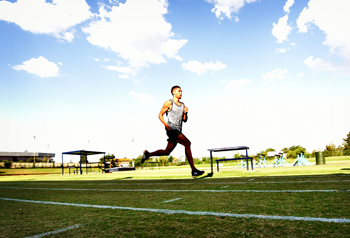
The Kovsie athlete Wayde van Niekerk received a hat trick of awards at the SA Sports Awards on Sunday 22 November 2015. He was named Sports Star of the Year, Sportsman of the Year, and was crowned as winner in the People’s Choice category.
Photo: Charl Devenish
|
Wayde changed the game – Naidoo
For a long time, AB de Villiers and Chad le Clos have dominated fan support in South Africa, but Wayde van Niekerk changed the game.
This was what Kass Naidoo, well-known sports journalist and cricket commentator, tweeted after the Kovsie athlete, Wayde van Niekerk, made a clean sweep at the tenth SA Sports Awards in his home town, Bloemfontein, on Sunday 22 November 2015.
According to Naidoo, the golden boy from the University of the Free State (UFS) is now the hottest property in South Africa, and should be watched during the 2016 Olympic Games in Rio de Janeiro.
Hat trick for Kovsie athlete
Naidoo was one of several celebrities to congratulate Van Niekerk on Twitter after Wayde received a hat trick of awards in the Sand du Plessis Theatre. The 400 m athlete was named Sports Star of the Year, Sportsman of the Year, and was crowned as winner in the People’s Choice category.
Apart from this, a humble Van Niekerk received total prize money of R1,1 million and two luxury Mercedes Benz vehicles - one for Sports Star of the Year and one as People’s Choice winner.
Big names outperformed
What makes his awards even more remarkable is the fact that he has outperformed several big names.
In addition to De Villiers and Le Clos, the tennis player, Kevin Anderson, the swimmer, Cameron van der Burgh, and the athlete, Caroline Wöstmann, were all nominated for Sports Star of the Year.
For the People’s Choice Award, Van Niekerk beat De Villiers, the cyclist, Ashleigh Moolman-Pasio, (who was crowned Sportswoman of the Year), Le Clos, and the wheelchair tennis player, Lucas Sithole. The public voted for this award.
Le Clos was nominated with the mountain biker, Greg Minnaar, for Sportsman of the Year.
Best is yet to come
“I don't think we have seen the best of Wayde. Hopefully that will come in Rio next year, along with a gold medal,” Naidoo tweeted.
The Springbok winger, JP Pietersen, also congratulated Van Niekerk on the social network, saying that he deserved his award as Sportsman of the Year.